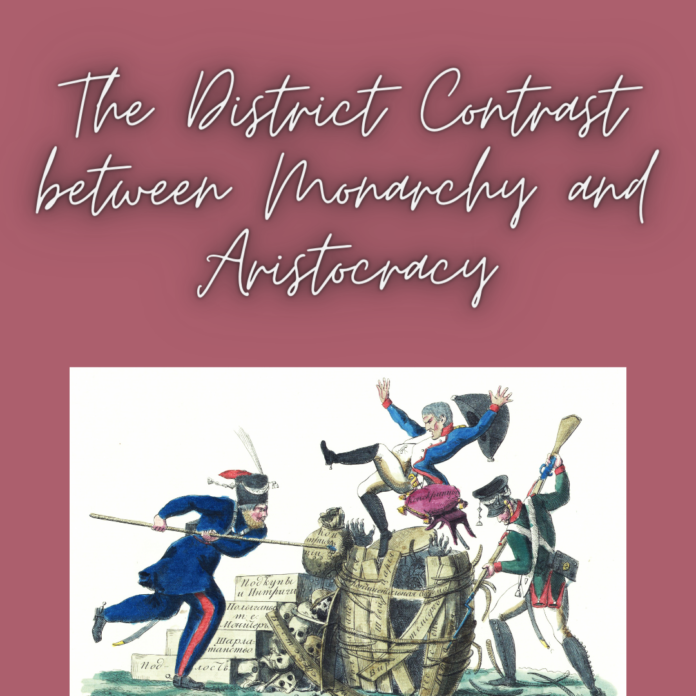A governing head — a prerequisite state of one nation to fuel its country’s economy; to rectify the lives of many; establish perfervid relations between citizens; and augment societal growth. As one of civilization’s first humans, the Sumerians instituted the world’s first government back in 508 bce. In ancient Greek where many city-states hold different forms of government, democracy was juxtaposed along with elite governance ( aristocracy ), monarchy, and tyrants. In this essay, we will be delving into the monarchical and aristocratic governments, and understanding them at a higher level. We’ll be tackling its background, types, advantages and disadvantages, and roles. Regardless of what government form you are in, it’s quite undeniable that it has impacted, influenced and changed society.
Backgrounds
Monarchy is a political system in which an undivided sovereignty rules the state. The term’s pertinent to states in which the monarch is endowed with elite and supreme authority. This monarch connotes a traditional, hereditary position, with predominantly symbolic power. Monarchy consists of distinct yet interdependent institutions. It both practices on being a state administrative yet, on the other hand, lavish ceremonials and court society. All this tantamounts to: providing a social life for the members of the dynasty; fostering a liberal constitution; and sustaining the sumptuous lifestyle of the associated elite class. A “court society”, termed by German-born sociologist Nobert Elias, is the designation of various groups of nobility that are amalgamated to monarchical dynasties through a web of personal bonds. These bonds encapsulate dynasty relations ( from other monarchical countries ) and are evident in emblematic and ceremonial propriety.
Aristocracy as an identifiable element of a matriarchate epitomizes human societies from ancient civilizations. Aristocracies were historically the premier model of governance almost throughout history and time. The term aristocracy is often used as “the ruling of the upper class” over a stratified society. Ergo, the “higher” political aristocracy of the state; the echelon of the highest religious dignitaries authorizes the aristocracy of the church; and those indulged with excellent education, constitutes aristocratic wealth. Unlike monarchy, the throne could still be passed on non hereditarily, since in some caste societies, the nobility and others that are lower than aristocrats, can move into higher castes and vice versa. The aristocrats are satiated with both political and socio-economic power. In our era, we come up against a plethora of transcendental methodological dilemmas. But with the aid of their resolutions, it allows us to probe a wider argument on the possible foundations of the Europeans’ elite class society’s sociocultural history.
Its Types
Monarchies:
- Constitutional
- Absolute
Constitutional Monarchy
Constitutional Monarchy is a system in which the monarch acts as a head of state in a non-political party under a written or blended constitution. Political scientist Vernon Bogdanor, has defined constitutional monarchy as ,”A sovereign who reigns, but does not rule”. Basically, the monarchs are demarcated to employ their power and authorities within the prescribed limit that are stated in the established legal framework. In other Commonwealth nations, where they institute a semi-parliamentary system, the monarchs may strictly have Ceremonial duties, discretionary powers or reserve powers, depending on the constitution. Dating back to Ancient times, the oldest constitutional monarchy was of the Hittities. During the Bronze Age in Anatolia (now Turkey ), their king or queens had to share authority with democratic assemblies called Panku–a general council filled with fighting warriors and the king’s servants. Today, the constitutional monarchy is well-substantiated with representative democracy and exemplifies a great mixture of highly educated electorates, and well-trained monarchs raised for the role since their birth.
Absolute monarchy
Established in the 17th century, the absolute monarchy was the epitome of “supreme sovereignty”. Throughout much of European history, the absolute monarchy became the theological justification of the divine right of kings. An absolute monarch wields unhindered dominion, political power, and tyrannical control ( in earlier centuries ) over the sovereign state and its citizens. Surprisingly, not all absolute monarchs can be inherited hereditarily. There are plenty of attested ways as to the transmission of power and control to a non-hereditary absolute monarch. In Medieval India, the leaders of the Satavahana, Gupta, Maurya, and Chalukya empires as well as other leaders of minor empires, were reckoned as absolute monarchs. Furthermore, European monarchs performed practices of the divine right kings, meaning that the gods have bestowed the power and autocracy to the monarchs. This accelerated the monarch’s power since it certified that their power did not come from the people, and therefore the people had no say or opinion about the monarch’s ruling.
Aristocracy:
- Plutocracy
- Oligarchy
Plutocracy
Plutocracy is an underhand government exclusively run by the rich and powerful in a direct or indirect manner. Like its greek roots, “ ploutos” or wealthy, and “kratos”- power ruling, it’s designed primarily to assist the needs and entreaties of the wealthy and solidify their social standing. Plutocracy is created through the allowance of access to certain government programs and resources only to the rich, thereby creating it so socialites hold more sway. Such as, for example what President Theodore Roosevelt said: “Of all forms of tyranny the least attractive and the most vulgar is the tyranny of mere wealth, the tyranny of plutocracy”. This statement shows concerns, as if the rich continue to practice plutocracy, the regulatory focus will be heavily concentrated on the desires of the wealthy, creating higher salaries for them, which in turn, will lead to asset-based income inequality.
Oligarchy
The word “oligarchia”, first coined by Aristotle, was used to designate the rule of the few when it was led not by the best leaders but by corrupt persons. In this regard, oligarchy is the debauched form of aristocracy, in which the ‘best ruling’ individual is made leader and has the power vested unto him. Most of the famous oligarchies have ensued when hegemonizing elites were enlisted from a governing caste — a hereditary social grouping with the basis of kinship, religion, prestige, economic status, and for some, language. These ruling elites tend to utilize their power for the benefit of their own social class. Perhaps the most popular current employments of the term oligarchy happens in “iron law of oligarchy,” an idea concocted by the German social scientist Robert Michels to allude to the supposedly inescapable propensity of ideological groups and worker’s guilds to become bureaucratized, incorporated, and traditionalist.His thinking was that, regardless of how egalitarian or even extremist the first belief system and objectives of a gathering or association might be, there should arise a restricted gathering of pioneers at the middle who can coordinate force productively, complete things through a managerial staff, and develop some sort of thorough request and philosophy to guarantee the endurance of the association when looked by interior division and external opposition. The main difference between oligarchy and plutocracy is that oligarchy relies on its structural power, as to plutocracy, it’s a social system built and ruled by the associated wealthy or socialites.
Advantages & Disadvantages
Advantages of Monarchy:
- Political Polarization Reduction
- Lessening corruption
- Monetary Resources are mostly well-utilized
- Stronger military defense
- Establishes a single form contact between foreign governments
- Solidified government
- Leadership stability
- Extensively helpful for undeveloped societies
Disadvantages of Monarchy
- Obstructs democratic legitimacy
- Deficiency in democratic accountability and liability
- Degenerate into dictatorships
- Inequality of Wealth
- Strongly centralizes power and glory to a single individual
- Congregation of Wealth
- Institutes a system of social class
- Potentially assert control over federal government
Advantages of Aristocracy
- It prevents controlling power from a single person, by distributing power between its members
- Well-organized chain of command
- Leaders are mostly highly-qualified and laudable
- Lesser individuals are involved
Disadvantages of Aristocracy
- The public aren’t allowed to vote
- Leaders aren’t accountable for their actions
- Lacks civil liberties and privileges
- Economic division between the poor and the rich
- Unrestricted power
Overall, if we want to establish a systematic government, we need to strike a balance between these pros and cons. Making sure that regardless of the amount of power that the monarchs have, we still get our voice and opinions to be heard. It’s essential for us to build a government-citizen relationship, for our society to transcend greatly.
Roles
The Monarch in Britain has an illustrious privileged job to carry out. This can be named as being essential for the protected jobs. The illustrious privileged job incorporates the forces to proclaim war, manage the common assistance, wipe the slate clean, excuse priests, issue travel papers, control the common help, and arrange settlements and arrangements just as coordinating military activities. These forces can be rehearsed as long as they don’t struggle with the laws in the United Kingdom. In Britain; the genuine force is held by the parliament; however the Queen stays sovereign. Hypothetically, the chief force of the public authority is somewhat held by the sovereign. This ‘little however vital’ power is the regal right. The Monarch can exhort the parliament. This is done either through the Privy Council or through the Prime Minister. The right obligations are proceeded as prompted by the Prime Minister. As a matter of fact, the Sovereign has no control on it. During the week by week gatherings with the Prime Minister, the Monarch’s interpretation of any issue might be communicated. As indicated by Bagehot; “the Sovereign has, under sacred government… three rights — the option to be counseled, the option to energize, the option to caution. Illustrious rights are constantly restricted however it might require no conventional endorsement by the parliament. For instance: the Queen can’t exclusively add any new types of tax collection to the current ones. In such a case, the Parliament needs to come in for approval. Thus, the Monarch can’t begin rehearsing any ‘new’ privilege powers. The privilege choices of the Monarch can be abrogated by the parliament if the parliament is to pass enactment.
According to the political definition, aristocrats were those who held political power—usually the wealthiest members of society. The hereditary definition, by contrast, depended on birth. The idea behind this view was that great people passed on their qualities to their descendants.
We live during a time of dynamic advancement, and the specialty of government is developing like all the other things around us. It is a cleaner quintessence of government, more focused and strengthened, than has at any point yet been utilized. It is government more or less, government stripped, as a few of us affirm, of all its beyond a doubt adored fictions, voting booths, ideological groups, House of Commons rhetoric, and the remainder of it. Loathe it or love it, the government has had gigantic impacts on our lives. We’ve changed, we’ve grown, and we’ve transcended, all attributed to the great leaders who made our society a tolerable place.










